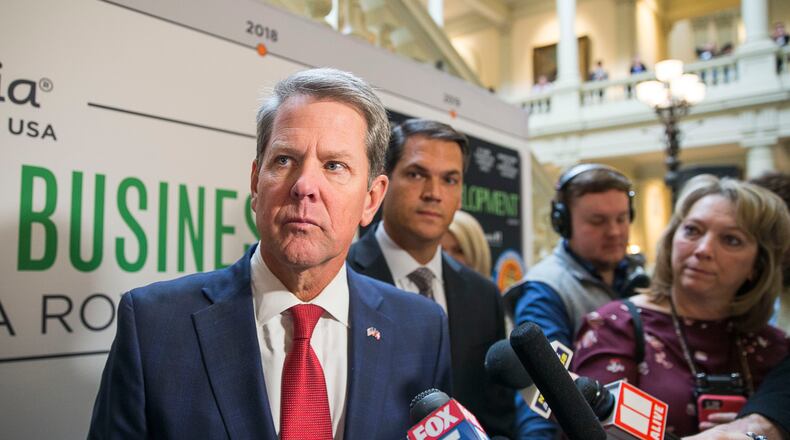A federal judge’s decision Friday that the feds must allow Gov. Brian Kemp to proceed with his plans for a narrow expansion of Medicaid drew quick reaction from citizens and politicians alike.
The issue of whether to fully expand Medicaid to all of Georgia’s poor adults — or expand it in a limited manner with work and engagement requirements, as Kemp proposes — has remained a key question in state policy and a hot political one.
Stacey Abrams, who is running against Kemp for governor in November’s elections, has made full Medicaid expansion a top priority.
In a statement to the AJC after the judge’s ruling Friday, Abrams spokesman Alex Floyd said, “Georgians are already struggling with high prices across the board, but Brian Kemp continues refusing to take steps like actually expanding Medicaid that could bring down health care costs for all Georgians.
“Instead,” Floyd said, “Kemp is still trying to force through expensive halfway measures that cover fewer Georgians at a higher price.”
Under the Affordable Care Act, states can decide what to do about Medicaid when it comes to their uninsured poor adults. A full expansion of Medicaid would be 90% funded by the federal government, a special rate for full expansion programs that would bring billions of federal dollars into the state. Under Kemp’s more modest plan, the federal contribution to Medicaid coverage would be the regular rate of just about 66%, with the remainder paid by the state.
A full expansion would also cover far more people — perhaps 400,000 as opposed to 50,000 under Kemp’s plan — which multiplies that federal contribution far more. Hospitals like that idea, which might relieve their financial burden of treating uninsured patients and not getting reimbursed.
But any Medicaid expansion would require money from the state general fund, too. If the state is paying 10% of the cost for 400,000 people, that’s a lot of money. Republican state leaders have expressed concern about that.
Kemp on Friday celebrated the judge’s ruling in a tweet.
The Georgia Public Policy Foundation, a libertarian-leaning think tank, agreed with him.
Foundation president Kyle Wingfield wrote in a statement online, “This waiver was a well-considered effort to offer a path to health coverage for low-income Georgians in a better way than traditional Medicaid — exactly the kind of demonstration project that Section 1115 of the Social Security Act is meant to encourage.”
Kemp’s plan is called a “demonstration waiver” because federal law allows the government to waive some requirements for states to try out proposals that might customize a program to the state’s needs. They’re called demonstration waivers because they try to demonstrate the proposal’s success.
Wingfield said that for those who get covered under the Kemp plan, there is also the possibility for some of advancing to private insurance coverage. “This kind of coverage offers them better access to more healthcare providers, which in turn should lead to better health outcomes,” he said.
Georgians for a Healthy Future, which prefers full Medicaid expansion, disagreed.
“If today’s court ruling stands and the Governor moves forward with his plan,” wrote GHF director Laura Colbert, “most of the uninsured Georgians who keep our communities moving will still have no meaningful pathway to health coverage. Nine in ten of those Georgians will still be uninsured without meaningful access to a doctor. Our rural hospitals will continue to struggle to keep their doors open.”
“The Governor will spend three times more per person than is necessary,” she said, referring to the federal contribution, “leaving billions of dollars on the table that are meant to improve health care access for Georgians.”
The Biden administration’s U.S. Centers for Medicare and Medicaid Services did not provide comment Friday by deadline.
CMS will almost certainly appeal the ruling.
AJC reporter Greg Bluestein contributed to this story.
About the Author
The Latest
Featured



